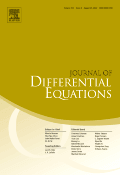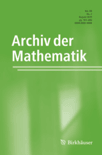
Electronic Journal of Qualitative Theory of Differential Equations
metrics 2024
Transforming Ideas into Mathematical Solutions
Introduction
The Electronic Journal of Qualitative Theory of Differential Equations, published by the esteemed UNIV SZEGED's BOLYAI INSTITUTE in Hungary, is a prominent platform in the realm of applied mathematics, recognized for its rich contributions to the field since its inception in 1998. With an ISSN of 1417-3875 and open access format, the journal ensures that cutting-edge research is accessible to a global audience, fostering collaboration and knowledge exchange among researchers, professionals, and students alike. It holds a commendable Q2 ranking in Applied Mathematics, reflecting its commitment to high-quality scholarship, and maintains a respectable Scopus rank, positioned at #432 out of 635. Covering a wide spectrum of qualitative theories related to differential equations, the journal guides its readers through the complexities of mathematical theories and applications, making it an essential resource for anyone looking to deepen their understanding in this vital area of study. The journal's focus on innovative and interdisciplinary approaches ensures that it remains at the forefront of mathematical research, ultimately contributing to advancements in the field.
Metrics 2024
 0.48
0.48 1.10
1.10 0.90
0.90 39
39Metrics History
Rank 2024
Scopus
IF (Web Of Science)
JCI (Web Of Science)
Quartile History
Similar Journals

Mediterranean Journal of Mathematics
Elevating Research Standards in the Heart of the MediterraneanThe Mediterranean Journal of Mathematics, published by SPRINGER BASEL AG, is a prominent platform dedicated to the advancement of mathematical research and education. Since its inception in 2004, this journal has been pivotal in disseminating high-quality research across various fields of mathematics, currently holding a notable Q2 ranking in the miscellaneous mathematics category as of 2023. With its ISSN 1660-5446 and E-ISSN 1660-5454, the journal enjoys a respected position in the academic community, evident by its Scopus rank of 129 out of 399 in General Mathematics, placing it in the 67th percentile. While primarily a subscription-based journal, it remains committed to providing a comprehensive resource for researchers, professionals, and students, fostering dialogue and exploration within the mathematical sciences. The Mediterranean Journal of Mathematics, based in Basel, Switzerland, continues to contribute significantly to the evolution of mathematical theory and practice, marking its relevance as we approach its 20th anniversary in 2024.

Analysis & PDE
Empowering Scholars with Cutting-Edge Mathematical Insights.Analysis & PDE is a premier journal dedicated to advancing the fields of analysis and partial differential equations, published by Mathematical Science Publications. With its ISSN 1948-206X, this journal has established itself as a critical platform for the dissemination of high-quality research since its inception in 2008. An indicator of its scholarly impact, it holds a prestigious Q1 ranking in the 2023 categories of Analysis, Applied Mathematics, and Numerical Analysis. The journal's esteemed standing is further underscored by its impressive Scopus rankings, including Rank #24 in Mathematics Analysis, placing it in the 87th percentile of its category. Aimed at researchers, professionals, and advanced students, Analysis & PDE provides a vital forum for innovative studies that push the boundaries of mathematics while fostering a deeper understanding of analytical methods and their applications across various real-world challenges. With no open access restrictions, it remains an accessible resource for the global research community. For more information, please reach out to the editorial office at the Department of Mathematics, University of California, Berkeley.

Computational Methods and Function Theory
Pioneering methodologies in mathematics and function theory.Computational Methods and Function Theory is a distinguished journal published by SPRINGER HEIDELBERG, dedicated to advancing the fields of computational mathematics and functional analysis. With its ISSN 1617-9447 and E-ISSN 2195-3724, this journal serves as a vital resource for researchers, professionals, and students seeking to explore state-of-the-art methodologies and theoretical developments from 2011 to 2024. Its robust ranking positions it in the Q3 category for Analysis and Computational Theory and Mathematics, and Q2 for Applied Mathematics, reflecting the journal's influence and credibility within the scientific community. Residing in Germany, the journal promotes open dialogue and innovative solutions to complex mathematical problems, making significant contributions to both theoretical and applied disciplines. Its impact is evidenced by strong Scopus rankings, asserting its relevance and rigorous peer-review processes, which ensure high-quality publications. This journal stands as a key platform for disseminating groundbreaking research and fostering collaboration across disciplines.

Dynamics of Partial Differential Equations
Pioneering Insights in Applied MathematicsDynamics of Partial Differential Equations is a prestigious peer-reviewed journal published by INT PRESS BOSTON, INC in the United States, specializing in the intricate and innovative field of partial differential equations (PDEs). With an ISSN of 1548-159X, this journal has become an invaluable resource for researchers, professionals, and students alike since its inception in 2007. The journal is recognized for its rigorous scholarship, as indicated by its 2023 category quartiles, achieving Q1 status in Analysis and Q2 in Applied Mathematics. The Scopus rankings further affirm its relevance, placing it within the top half of its field. While the journal operates under a subscription model, it remains a vital platform for disseminating cutting-edge research that addresses both theoretical and applied aspects of differential equations, contributing significantly to advancements in mathematics and related disciplines. It serves as a meeting ground for researchers dedicated to exploring the dynamic and evolving nature of PDEs, fostering collaboration and innovation within the academic community.

Journal of Mathematical Extension
Unleashing the Power of Mathematics for All.Journal of Mathematical Extension, published by Islamic Azad University, Shiraz Branch, is a leading section in the field of mathematics, dedicated to the dissemination of innovative research and theories since its establishment. With an Open Access model adopted in 2006, the journal provides a platform for researchers and scholars worldwide to share their findings, ensuring that knowledge is accessible to all. The journal focuses on a wide array of topics within the mathematical sciences, promoting interdisciplinary studies that connect mathematics to real-world applications. As a repository of cutting-edge research, Journal of Mathematical Extension is essential for academics, practitioners, and students alike, contributing to the advancement of mathematical understanding and its practical uses in various domains. Located in Shiraz, Iran, this journal embodies the commitment to nurturing a global community of mathematicians and researchers striving for excellence in the field.

Journal of Differential Equations
Connecting Theory and Application in MathematicsJournal of Differential Equations, published by ACADEMIC PRESS INC ELSEVIER SCIENCE, is a leading academic journal established in 1965, dedicated to advancing the field of differential equations. With an impressive impact factor that illustrates its significant influence, the journal ranks in the Q1 category in both Analysis and Applied Mathematics, reflecting its high-quality research and contributions to the discipline. The journal is well-respected, holding prominent positions in Scopus rankings, including Rank #14 in Mathematics - Analysis and Rank #118 in Mathematics - Applied Mathematics, both indicating exceptional impact in their respective fields. Although the journal operates on a traditional publication model without an Open Access option, researchers, professionals, and students will find a wealth of vital research articles that address both theoretical and practical aspects of differential equations. As the journal continues to publish cutting-edge work through to 2024, it remains essential for those looking to deepen their knowledge and engage with the latest findings in this dynamic area of mathematics.

Boundary Value Problems
Exploring the Frontiers of Mathematical SolutionsBoundary Value Problems, published by SPRINGER, is a pioneering open-access journal dedicated to the dissemination of high-quality research in the fields of mathematics, specifically focusing on algebra, number theory, and analysis. With an ISSN of 1687-2770 and an impressive impact factor reflecting its robust contribution to the academic community, particularly as it has achieved a Q3 ranking in both Algebra and Number Theory and Analysis categories in 2023, the journal serves as a vital platform for researchers, professionals, and students alike. Since its inception in 2005, Boundary Value Problems has been committed to fostering innovative breakthroughs and sharing knowledge that drives new perspectives and methodologies within the mathematical sciences. By facilitating open access to its articles, the journal ensures wide visibility and accessibility of cutting-edge research, making it an essential resource for anyone interested in boundary value problems and their multifaceted applications across various disciplines.

Electronic Journal of Differential Equations
Championing accessibility in the world of differential equations.The Electronic Journal of Differential Equations, published by Texas State University, is a premier open-access platform dedicated to the dissemination of high-quality research in the field of differential equations. Established in 1993, this journal not only promotes the accessibility of mathematical research but also fosters a collaborative approach to innovation and discovery within the mathematical community. With an impressive converged publication record from 1996 to 2024, it serves as a vital resource for researchers, professionals, and students alike, showcasing significant contributions to the discipline. Highlighted in the 2023 Scopus ranking, the journal stands in the Q3 category for Analysis with a current rank of #120 among 193 journals, placing it in the 38th percentile. The journal's commitment to open access ensures that groundbreaking findings are freely available to all, thereby enhancing its impact and reach in the ever-evolving landscape of mathematical analysis.

ARCHIV DER MATHEMATIK
Pioneering Research in the Heart of MathematicsARCHIV DER MATHEMATIK is a distinguished journal published by SPRINGER BASEL AG, renowned for its contributions to the field of mathematics. Established in 1948 and continuing its legacy through to 2024, the journal provides a platform for innovative research and scholarly articles that push the boundaries of mathematical theory and application. With an ISSN of 0003-889X and an E-ISSN of 1420-8938, it holds a reputable position within the academic community, reflected by its Q2 ranking in the 2023 Mathematics (Miscellaneous) category. Despite not being an open access publication, ARCHIV DER MATHEMATIK remains accessible to a global audience through various databases, ensuring the dissemination of high-quality research. The journal’s commitment to enhancing mathematical discourse makes it an essential resource for researchers, professionals, and students seeking to expand their understanding of this vital discipline.

Differential Equations and Dynamical Systems
Bridging Gaps in Analysis and Applied MathematicsDifferential Equations and Dynamical Systems is a prominent academic journal published by Springer India, dedicated to the fields of analysis and applied mathematics. With an ISSN of 0971-3514 and an E-ISSN of 0974-6870, this journal serves as a platform for scholars to disseminate innovative research on differential equations and their applications in various dynamical systems. Recognized within the Q3 category for both Analysis and Applied Mathematics, it ranks impressively in Scopus, highlighting its contribution to the advancement of mathematical sciences. The journal aims to foster interdisciplinary research and provide an inclusive forum for researchers, professionals, and students engaged in this vital area of study. Although not open access, it offers valuable insights and findings published from 2008 to 2024, reinforcing its importance as a resource for ongoing developments in mathematical analysis. As a reputable source in its field, it invites contributions that challenge existing paradigms and inspire further inquiry.